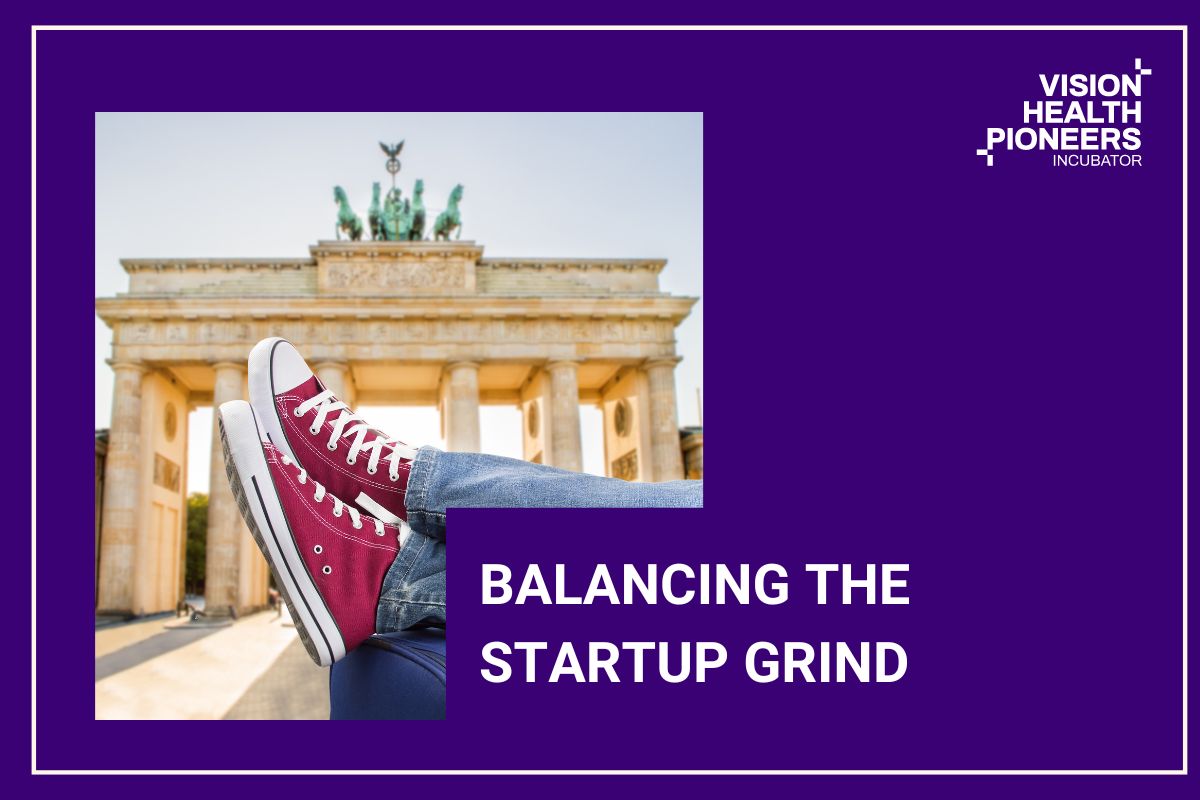
19 Jun Balancing the Startup Grind: Mental Health Insights and Strategies from Urte Zahn
Q: Can you share a bit about your background and what drew you to focus on mental health in the startup community?
A: I’ve worn many hats over the years. I’ve worked for four large corporations, founded three startups, and now, I coach—mostly female founders of tech startups. Oh, and I’m also a martial arts teacher and practitioner in Yiquan and Tai Chi. Because Germany loves its certifications, I’m also officially recognized as a business coach and mental fitness coach. To top it off, I teach positive psychology at Victoria University. So, yeah, my calendar is quite colorful!
Q: What are some of the most common mental health challenges that startup founders face?
A: Startup life can be a mental rollercoaster. A BusinessInsider report mentioned that 72 percent of founders suffer from mental health issues, based on a 2015 study that still holds true. It often starts with constant worrying, leading to exhaustion and sleepless nights. Weekends no longer recharge you, and you lose your passion and purpose. Friends and family start giving you “the look,” and you realize something’s off. The usual response? More pressure and more work, leading to a downward spiral into serious health issues like depression, burnout, and migraines. Fun times, right?
Q: How do these challenges differ from those experienced by leaders in more established companies?
A: The main difference is speed. In startups, everything happens at lightning speed, including burnout. Founders are often pragmatic, goal-driven, and inspirational—until they’re not. Corporate leaders face similar issues but generally have more resources to cope. Overusing their strengths can lead to self-sabotage, control issues, and increased anxiety. Basically, it’s a high-speed train versus a long-haul flight.
Q: What are some strategies that you have found effective in helping founders build resilience?
A: Where there’s a downward spiral, there’s also an upward spiral. Positive emotions like happiness and curiosity can lead to new skills and stronger relationships, according to Barbara Fredrickson’s research in positive psychology. The key is not doing more of what’s bad for you but doing less and focusing on building inner confidence. Embrace paradoxes like “non-doing equals doing”—very Yin Yang.
Q: How can founders maintain a healthy work-life balance when their startup demands so much of their time and energy?
A: There’s no shortcut here—no “7 habits to bring you back on track” or “3 things that changed my life.” Achieving a healthy work-life balance is like building a muscle; it takes time and effort. Founders need to treat mental fitness with the same seriousness as physical fitness. Think of it as meditating your way to success, one deep breath at a time.
Q: Are there any particular tools or resources that you find particularly helpful for managing stress and mental health in the startup world?
A: Absolutely, it’s all about finding what works for you. But here are a few tips to get you started:
- Morning Flight Mode: Start your day with 30 minutes of no calls or messages.
- Schedule Breaks: Even small breaks can make a big difference.
- Nature: It’s an incredible resource for resetting your mind.
- Time Boxing: Work in focused intervals, like 30 minutes at a time.
- Breathing Exercises: Focus on your breath for a minute to calm your mind.
- Celebrate Doing Nothing: Take a few minutes to enjoy not doing anything.
- Celebrate Milestones: Even small achievements deserve recognition.
- Include Others: Share your celebrations with your team.
- Deepen Relationships: Invest time in building strong connections.
- Evening Journaling: Reflect on your day and your progress.
Q: How can startup teams create a culture that supports mental health and well-being?
A: Culture starts at the top. If founders work 70 hours a week with no breaks, the team will think that’s the norm. Show vulnerability and lead by example. Ask your team members how they’re really doing—and mean it. Don’t be afraid to ask for help and encourage others to do the same. Build deep relationships with your team, family, and friends.
Q: What role do investors and board members play in supporting the mental health of startup founders?
A: Investors are starting to pay attention. Some VCs now include wellbeing or coaching clauses in their contracts with founders, not just out of goodwill but as a risk mitigation strategy. Establish core values like openness, transparency, and trust, and share these with your investors.
Q: Berlin is known for its vibrant startup scene. How does the unique environment of Berlin influence the mental health challenges faced by startup founders here?
A: Berlin is fantastic but it’s a master at creating FOMO (Fear of Missing Out). There’s always a better event happening somewhere. Founders need to carve out space and time to connect with themselves and figure out what they truly want and need.
Q: What role does the cultural diversity in Berlin play in the mental health dynamics within startups?
A: Different cultures have different comfort levels with discussing vulnerability and mental health. It’s essential to recognize and respect these differences, creating a more inclusive and supportive environment.
Q: Are there specific mental health resources or support systems available in Berlin that you would recommend to startup founders?
A: There are several crisis lines available, like Telefonseelsorge (0800 1110111) and the Berlin Crisis Service, which are free of charge. Additionally, Stadtbewegung.de offers over 100 free outdoor activities sponsored by Berlin, including walking, yoga, Tai Chi, Qigong, fitness, boccia, and calisthenics. I also run a Qigong class every Tuesday at Park am Gleisdreieck at 8:30 am.
Q: How do Berlin’s economic and regulatory environments impact the mental health of startup founders?
A: You can’t control 95% of what happens in life, including Berlin’s economic and regulatory environments. Therefore, it’s important to stay flexible.
Q: What steps can the Berlin startup ecosystem take to better support the mental health of its founders in the future?
A: The ecosystem should offer more workshops on mental wellbeing and self-leadership, similar to those in the SIBB incubator program. Mental health should be a fundamental part of the support system, not just an afterthought.
Q: What changes would you like to see in the startup ecosystem to better support founders’ mental health in the future? How do you envision the future of mental health support for startup founders evolving in Berlin over the next few years?
A: I hope to see increased awareness among founders that burning out is not a badge of honor. Mental health and mental fitness should be seen as mandatory, not optional. Sharing best practices and focusing on inner strength and connectivity will lead to more relaxed, high-performing individuals. If everyone acts from a place of inner strength and is well-connected with themselves, we’ll see a more balanced and productive startup community.
Q: How can people get in touch with you or learn more about your work?
A: The easiest way to connect with me is through LinkedIn or via my website, where you can also access a free discovery coaching session. Keep an eye out for my classes and workshops, where I combine coaching with elements of martial arts. Additionally, I’ve been teaching Tai Chi and Qigong for Stadtbewegung every Tuesday for over four years. I also run various projects and occasionally seek fellows to join me.
Feel free to reach out—I’d love to hear from you!



